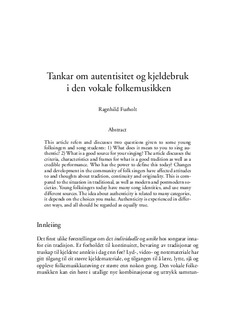| dc.contributor.author | Furholt, Ragnhild | |
| dc.date.accessioned | 2014-02-24T15:07:24Z | |
| dc.date.accessioned | 2014-03-04T08:41:15Z | |
| dc.date.accessioned | 2017-04-19T12:33:39Z | |
| dc.date.available | 2014-03-24 | |
| dc.date.available | 2017-04-19T12:33:39Z | |
| dc.date.issued | 2012 | |
| dc.identifier.citation | Furholt, R. Tankar om autentisitet og kjeldebruk i den vokale folkemusikken. Musikk og tradisjon 2012(26):10-34 | |
| dc.identifier.issn | 1892-0772 | |
| dc.identifier.uri | http://hdl.handle.net/11250/2438123 | |
| dc.description.abstract | This article refers and discusses two questions given to some young folksingers and song students: 1) What does it mean to you to sing authentic? 2) What is a good source for your singing? The article discusses the criteria, characteristics and frames for what is a good tradition as well as a credible performance. Who has the power to define this today? Changes and development in the community of folk singers have affected attitudes to and thoughts about tradition, continuity and originality. This is compared to the situation in traditional, as well as modern and postmodern societies. Young folksingers today have many song identities, and use many different sources. The idea about authenticity is related to many categories, it depends on the choices you make. Authenticity is experienced in different ways, and all should be regarded as equally true. | |
| dc.language.iso | nno | |
| dc.publisher | Novus | |
| dc.title | Tankar om autentisitet og kjeldebruk i den vokale folkemusikken | |
| dc.type | Journal article | |
| dc.type | Peer reviewed | |
| dc.description.version | Published version | |
| dc.rights.holder | © Copyright The Author. All rights reserved | |
| dc.subject.nsi | 110 | |
| dc.subject.nsi | 061 | |
| dc.identifier.cristin | 978930 | |
